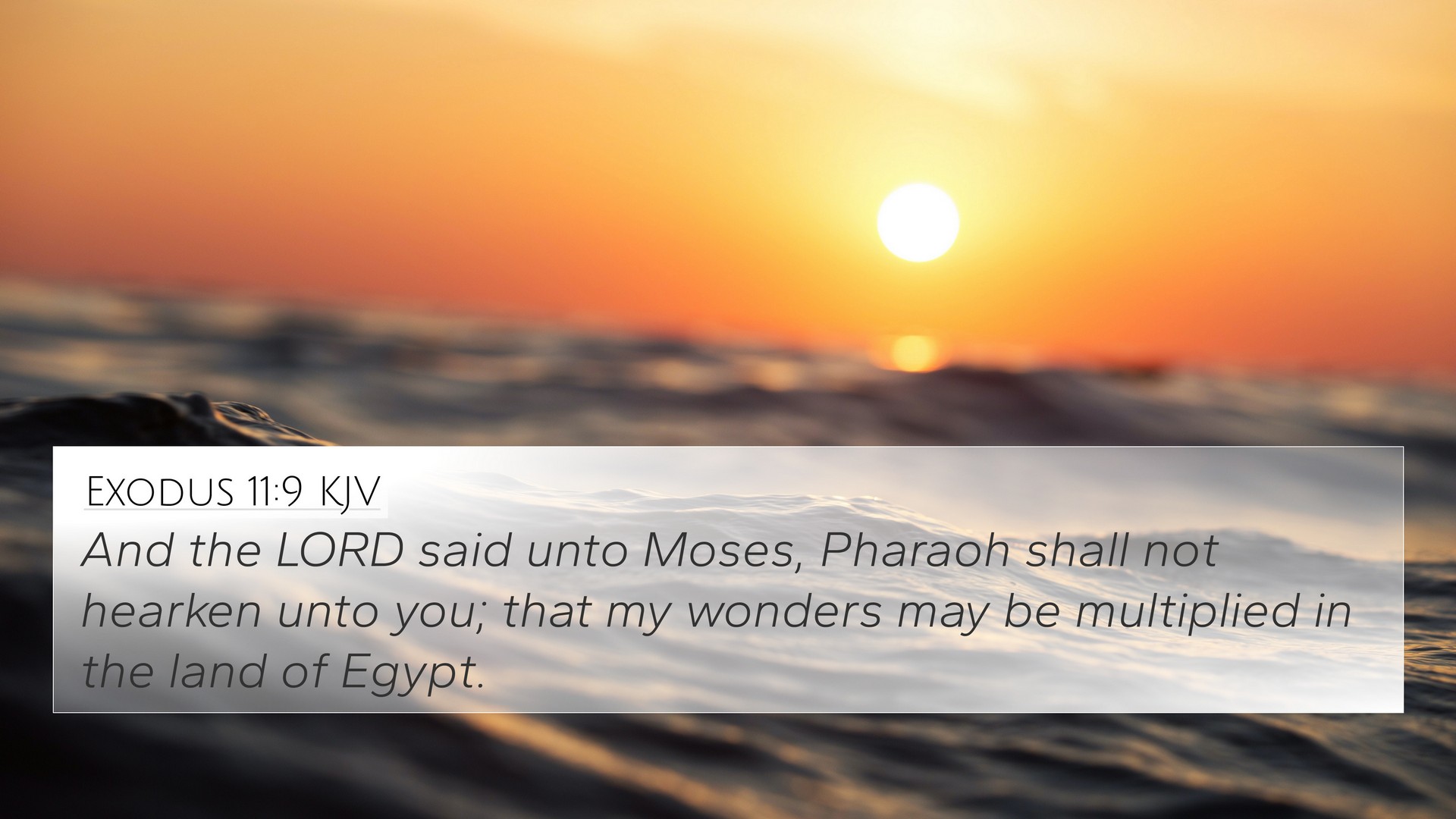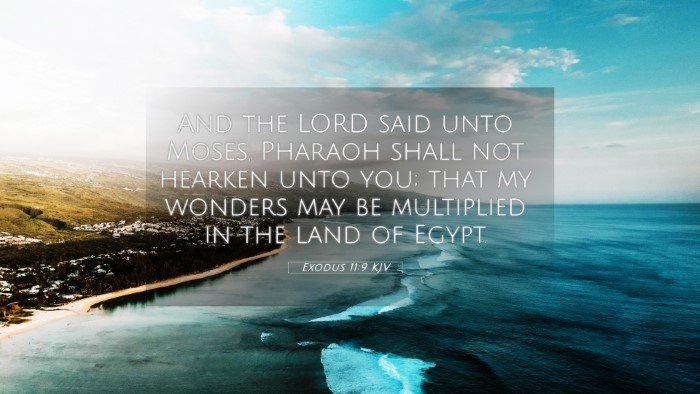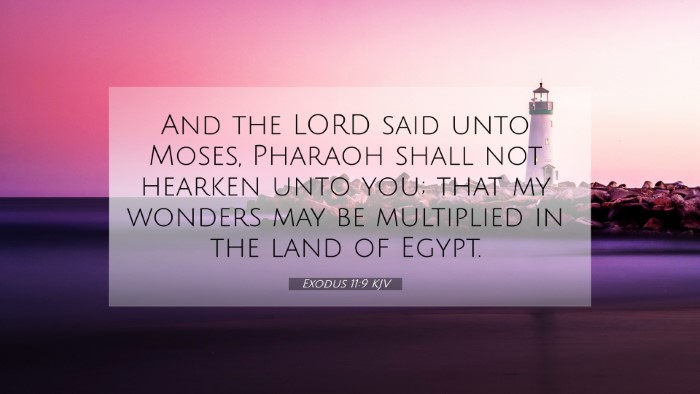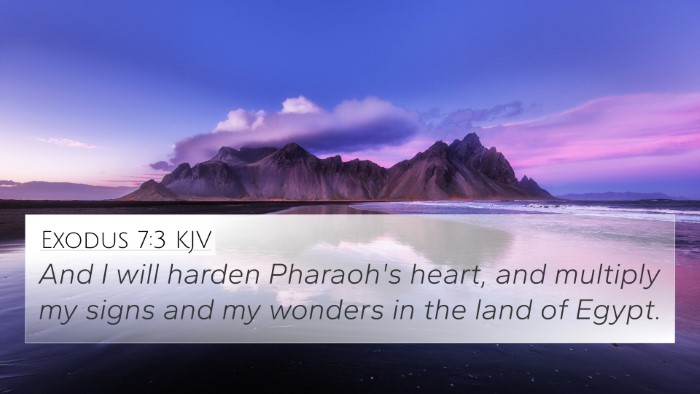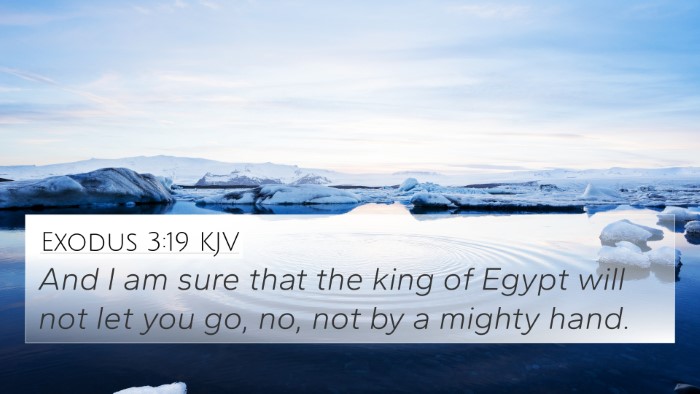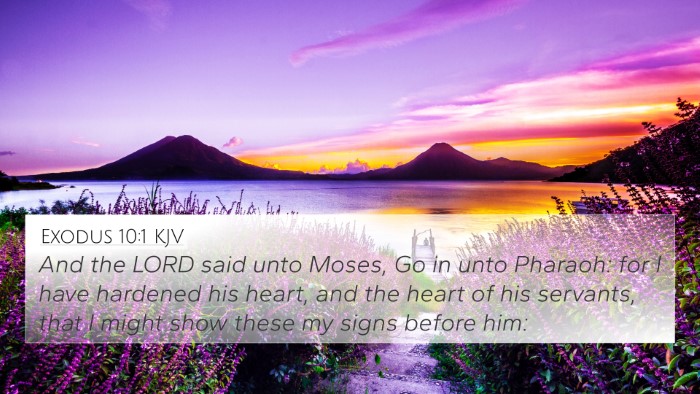Understanding Exodus 11:9
Exodus 11:9 states, "And the LORD said unto Moses, Pharaoh shall not hearken unto you; that my wonders may be multiplied in the land of Egypt."
This verse plays a crucial role in the biblical narrative, particularly in the events leading up to the Exodus of the Israelites from Egypt. Here, we unravel its meanings based on insights from notable public domain commentaries.
Context and Analysis
The context of Exodus 11 is pivotal. It is where God prepares Moses for the final plague that will persuade Pharaoh to release the Israelites from bondage. Understanding this moment requires an analysis of God's purpose and Pharaoh's hardness of heart.
God's Sovereignty and Pharaoh's Rejection
According to Matthew Henry, the assertion that "Pharaoh shall not hearken unto you" underscores God's sovereign control over the situation. His refusal is not simply a matter of obstinacy but part of a divine plan to display His power fully through the ensuing plagues.
The Purpose of the Plagues
In conjunction, Albert Barnes explains that the plagues serve a dual purpose: to bring punishment upon Egypt for its oppression of God’s people and to manifest God's incredible power. The wonders performed by God are intended to demonstrate that He is greater than the gods of Egypt.
Culmination of Divine Revelations
Adam Clarke emphasizes that by allowing Pharaoh's hardened heart to prevail, God magnifies His miraculous deeds in Egypt. This verse highlights the theme of divine revelation through human resistance, leading to the irresistible force of God's will being made known to both Egyptians and Israelites alike.
Thematic Connections in Scripture
Exodus 11:9 provides significant thematic connections across various scriptures. Understanding these parallels enriches our comprehension of God's narrative throughout the Bible:
- Romans 9:17 - "For the scripture saith unto Pharaoh, Even for this same purpose have I raised thee up, that I might show my power in thee..." - This verse underlines the idea of God's sovereignty in raising individuals for specific purposes.
- Isaiah 63:17 - "O LORD, why hast thou made us to err from thy ways, and hardened our heart from thy fear?" - A reflection on the hardening of hearts as a theme relevant to God's discipline.
- Hebrews 3:15 - "While it is said, Today if ye will hear his voice, harden not your hearts, as in the provocation." - A call to heed God's voice reflects the past and present hardness exhibited by Pharaoh.
- 2 Thessalonians 2:11-12 - Discussing delusion for those who do not love the truth, parallels the consequences of rejecting God's voice.
- Exodus 10:20 - "But the LORD hardened Pharaoh's heart, so that he would not let the children of Israel go." - Connects directly to the immediate narrative.
- John 12:40 - "He hath blinded their eyes, and hardened their heart; that they should not see with their eyes, nor understand with their heart..." - Aligns with the prophetic fulfillment of hard hearts against God's message.
- Psalms 105:26-27 - "He sent Moses his servant; and Aaron whom he had chosen. They shewed his signs among them, and wonders in the land of Ham." - Reflects on the mission of Moses and Aaron, emphasizing the signs and wonders that God performed.
- 1 Corinthians 10:11 - "Now all these things happened unto them for ensamples: and they are written for our admonition..." - Suggests the historical events serve as warnings and lessons for future generations.
- Jeremiah 7:25-26 - Discusses the consistent rebellion of the people, similar to Pharaoh’s responses to God’s commands, reflecting a pattern of rejection.
- Matthew 24:12 - "And because iniquity shall abound, the love of many shall wax cold." - In a broader sense of rejecting truth, parallels to Pharaoh’s ultimate stance against God’s will.
Conclusion
Exodus 11:9 showcases the striking dynamic between divine authority and human opposition, illustrating that even the hardest of hearts cannot overshadow God's plan to reveal His power and glory. The interconnectedness of this verse with other scriptures invites believers to explore how biblical themes recur throughout the text, paving the way for a deeper understanding of God's sovereignty through cross-referencing biblical texts.
For thorough Bible study, utilizing tools such as a Bible concordance or a cross-reference Bible guide enhances one’s study experience. These resources aid in linking Bible scriptures and understanding the profound interconnectedness of biblical messages, enriching one's faith and knowledge.
